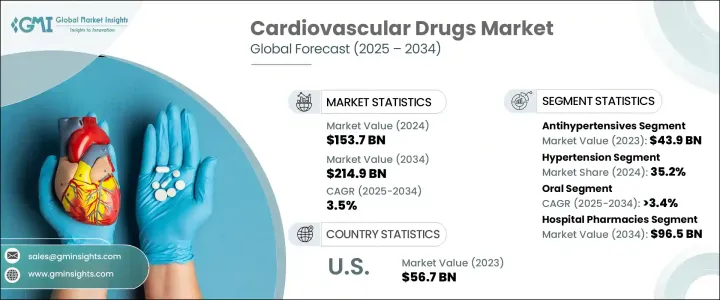
세계의 심혈관 치료제 시장은 2024년 1,537억 달러로 평가되었고 CAGR 3.5%를 나타내 2034년에는 2,149억 달러에 이를 것으로 예측되고 있습니다. 심혈관계의 건강에 대한 의식의 높아짐, 진단율의 상승, 예방 의료에의 대처의 급증은 시장의 성장에 크게 기여하고 있습니다. 또한, 운동 부족, 식생활의 혼란, 스트레스, 흡연, 음주 등 생활 습관에 관련하는 위험 인자가, 계속적인 약제.

특히 선진국에서는 세계 인구의 고령화가 진행되고 있으며, 고령자는 만성적인 심장병을 발병하기 쉽기 때문에 심혈관 치료제의 필요성이 더욱 높아지고 있습니다. 주요 기업들은 투자를 실시해, 보다 좋은 치료 효과, 부작용의 경감, 다양한 환자의 요구에 맞는 치료를 제공하는 의약품을 발매하고 있습니다. 맞춤형 의료에의 경도의 고조도 심혈관 치료의 전망을 바꾸고 있어, 기업은 보다 적정한 치료를 통해, 지금까지 충족되지 않았던 의료 요구에 대응할 수 있게 되어 있습니다.
| 시장 범위 | |
|---|---|
| 시작 연도 | 2024년 |
| 예측 연도 | 2025-2034년 |
| 시작 금액 | 1,537억 달러 |
| 예측 금액 | 2,149억 달러 |
| CAGR | 3.5% |
시장은 항고혈압제, 항고지혈증제, 항응고제, 항부정맥제, 기타 치료제 등의 약품 등급별로 구분됩니다. 이 약제 클래스별로는 ACE 억제제, 안지오텐신 II 수용체 길항제(ARB), β 차단제, 칼슘 채널 차단제, 이뇨제 등이 포함되어 모두 혈압을 낮추고 심각한 심혈관 합병증의 위험을 최소한으로 억제하기 위해 필수적이라고 생각되고 있습니다. 고혈압 분야는 세계의 고혈압 이환율 증가와 뇌졸중, 신부전, 심장 발작 등의 생명을 위협하는 질환과의 직접적인 관련에 견인되어 2024년에는 35.2%의 점유율을 점령했습니다. 고혈압을 효과적으로 치료하는 것은 의료 제공업체에게 여전히 최우선 사항이며, 단일 요법과 합제 요법을 모두 사용할 수 있으므로 개별 요구에 맞게 치료를 사용자 정의할 수 있습니다.
북미는 2024년에 세계의 심혈관 치료제 시장의 41.2%의 점유율을 차지했으며, 2034년까지의 CAGR은 3.2%를 나타낼 것으로 예측되고 있습니다. 미국에서는 심혈관 질환의 이환율이 높아지고 고령화가 급속히 진행되고 있기 때문에 진보적인 치료법에 대한 수요가 높아지고 있습니다.
세계의 심혈관 치료 시장에서 사업을 전개하는 주요 기업으로는 화이자, 존슨 엔드 존슨, 브리스톨 마이어스 스퀴브, 길리아드 사이언시스, 바이엘, 머크, 암젠, 사노피, 노바르테 이스, 아스트라제네카, 루팡, 비아트리스 등이 있습니다. 이러한 기업은 신약 클래스나 차세대 치료제으로 적극적으로 포트폴리오를 확대하고 있으며, 전략적 제휴와 연구개발에 대한 투자가 경쟁 우위를 유지하고 있습니다.
The Global Cardiovascular Drugs Market was valued at USD 153.7 billion in 2024 and is projected to grow at a CAGR of 3.5% to reach USD 214.9 billion by 2034. As the global burden of cardiovascular diseases continues to rise, the demand for effective and accessible treatment options is growing at an unprecedented pace. Healthcare systems around the world are under immense pressure to manage conditions such as coronary artery disease, heart failure, arrhythmias, and hypertension, which remain the leading causes of mortality across all regions. Increasing awareness of cardiovascular health, growing diagnosis rates, and a surge in preventive care initiatives are contributing significantly to market growth. In addition, lifestyle-related risk factors like physical inactivity, poor dietary habits, stress, smoking, and alcohol consumption are amplifying the need for ongoing pharmaceutical intervention.

The aging global population, particularly in developed nations, is further fueling the need for cardiovascular drugs as elderly individuals are more prone to developing chronic heart-related ailments. On the innovation front, advancements in drug delivery technologies and the introduction of next-generation treatment modalities are enhancing both therapeutic efficacy and patient compliance. Key players are investing heavily in research and development to launch drugs that offer better outcomes, reduced side effects, and tailored treatments suited for a variety of patient needs. The growing inclination toward personalized medicine is also reshaping the cardiovascular treatment landscape, allowing companies to address previously unmet medical needs through more targeted therapies.
| Market Scope | |
|---|---|
| Start Year | 2024 |
| Forecast Year | 2025-2034 |
| Start Value | $153.7 Billion |
| Forecast Value | $214.9 Billion |
| CAGR | 3.5% |
The market is segmented based on drug classes such as antihypertensives, antihyperlipidemic agents, anticoagulants, antiarrhythmics, and other therapies. Among these, the antihypertensives segment alone generated USD 43.9 billion in 2023, fueled by the increasing prevalence of high blood pressure worldwide. This drug class includes ACE inhibitors, angiotensin II receptor blockers (ARBs), beta-blockers, calcium channel blockers, and diuretics-all considered essential in lowering blood pressure and minimizing the risk of severe cardiovascular complications. The hypertension segment accounted for a 35.2% share in 2024, driven by the growing global incidence of high blood pressure and its direct link to life-threatening conditions such as strokes, kidney failure, and heart attacks. Managing hypertension effectively remains a top priority for healthcare providers, and the availability of both monotherapies and fixed-dose combination therapies ensures treatment can be customized to individual needs.
North America held a 41.2% share of the global cardiovascular drugs market in 2024 and is projected to grow at a 3.2% CAGR through 2034. The region benefits from strong healthcare infrastructure, high per capita health expenditure, and the presence of leading pharmaceutical firms. Additionally, the rising incidence of cardiovascular conditions and a rapidly aging population in the U.S. are boosting demand for advanced therapies. Government-driven initiatives promoting healthcare innovation and treatment accessibility are expected to further support regional market expansion.
Key players operating in the Global Cardiovascular Drugs Market include Pfizer, Johnson & Johnson, Bristol-Myers Squibb, Gilead Sciences, Bayer, Merck, Amgen, Sanofi, Novartis, AstraZeneca, Lupin, and Viatris. These companies are actively expanding their portfolios with novel drug classes and next-gen therapies, while strategic collaborations and investments in R&D continue to drive competitive advantage.